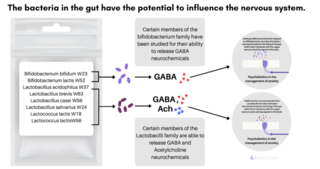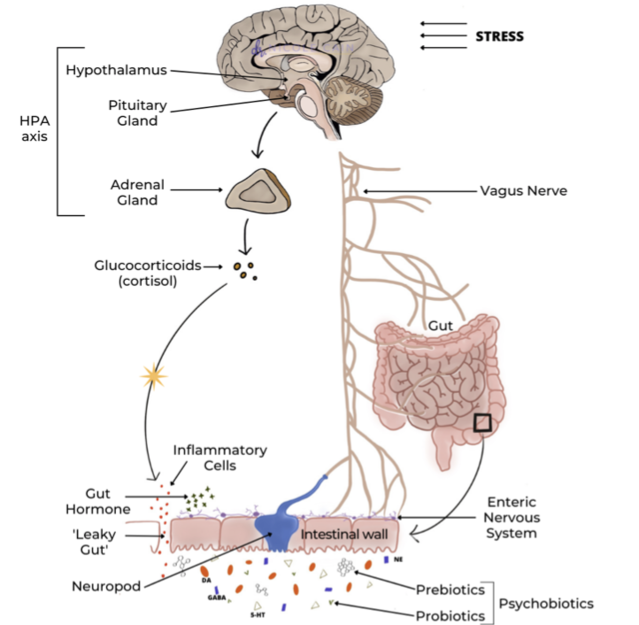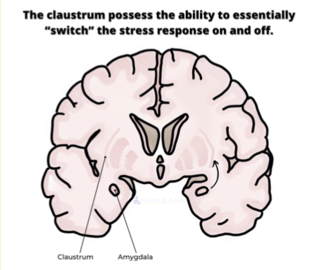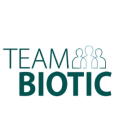Anxiety
Psychobiotics for Anxiety: What the Research Tells Us
3 ways gut microbes can mitigate angst.
Posted May 13, 2022 Reviewed by Hara Estroff Marano
Key points
- Psychobiotics offer viable anxiety management through the gut-brain axis.
- Psychobiotics are able to interface with the vagus nerve via specialized neuropod cells.
- Specific psychobiotic strains produce mood-altering neurochemicals such as serotonin, dopamine, GABA, and noradrenaline.
- Psychobiotics can help down-regulate the stress response.
By Nicole Cain, ND, MA
In light of a 25% increase in anxiety and depression worldwide, the World Health Organization has issued a scientific brief urging all countries to "wake up" and "step up" mental health services and support.1

Simultaneously, research into the gut-brain-axis continues to elaborate the value of psychobiotics—probiotics shown to positively influence the central nervous system—as a viable therapeutic tool. Use of psychobiotics is an appealing alternative for those who have experienced the side-effects of or dependence on psychotropic medications.2
Moreover, a 2022 publication in Frontiers In Neuroscience3 suggests that differences in gut microbial profiles play a role in the well-being of people prone to anxiety during and following the COVID-19 pandemic. The author suggests that “personalized nutritional therapy based on [individual] gut microbiota profiles" could be beneficial, citing the use of psychobiotics as an example.
Given the therapeutic potential, this article will explore three mechanisms by which psychobiotics can aid in anxiety relief.
1. Vagus Nerve Stimulation
The vagus nerve is one of the main communication channels between the brain and the gastrointestinal tract. When anxiety is due to autonomic arousal (fight/ flight/ freeze), activation of the vagus nerve can offer relief.

Research has identified specific strains of gut bacteria that possess the ability to interface with the vagus nerve directly, via the secretion of mood-altering neurochemicals from gut sensory epithelial or “neuropod” cells lining the gut.4 These fast-acting neurotransmitters include dopamine and noradrenaline generated by the Bacillus family, GABA by the Bifidobacteria family, serotonin by the Enterococcus and Streptococcus families, noradrenaline and serotonin by the Escherichia family, and GABA and acetylcholine by the Lactobacilli family.5
2. Cortisol Management
Cortisol is widely recognized as the principal hormone involved in the stress response, elevations of which result in anxiety, high blood pressure, and headaches.6 For individuals whose anxiety is related to spikes in cortisol, research into psychobiotic approaches to balancing cortisol appear promising.
One International Journal of Microbiology study examined the effects of a psychobiotic on salivary cortisol levels in stressed students. Results revealed that Lactobacillus plantarum 229v blunted acute anxiety response by prohibiting the increase of cortisol levels.7
Another 2021 publication in Frontiers in Nutrition corroborated the potential of psychobiotic therapies in acute stress mitigation. The investigators reported that administration of Lactobacillus plantarum PS128TM resulted in improvements in self-perceived stress, overall job-related stress, job burden, cortisol levels, general physical health, anxiety, depression, sleep disturbances, and perceived quality of life.8

3. Down-Regulation of "Stress Neurons"
While the exact mechanism of how the brain processes anxiety and stress is still somewhat mysterious, a publication in Science Advances revealed how a new form of microscopic imaging, termed block-face serial microscopy tomography (FAST), enabled researchers to identify a group of cells in the claustrum of the human brain that attenuates response to stress.9

Often described as the “cortical conductor,” the claustrum is a key region differentiating stressed brains from nonstressed brains. In fact, it appears that cells in the claustrum possess the ability to essentially switch the stress response on and off.10
The claustrum receives direct input from the amygdala, a part of the brain that previous studies, including a 2018 publication in Molecular Psychiatry, have suggested is strongly influenced by the host microbiome.11
These and other findings open the door for the development of new gut-brain-targeted therapies. For example: Low microbial diversity is associated with increased inflammation,2 inflammation has an inverse relationship with the amygdala’s fear response activation,13 and a clinically studied multistrain psychobiotic (Lactobacillus casei W56, Lactococcus lactis W19, Lactobacillus acidophilus W22, Bifidobacterium lactis W52, Lactobacillus paracasei W20, Lactobacillus plantarum W62, Bifidobacterium lactis W51, Bifidobacterium bifidum W23, Lactobacillus salivarius W24) demonstrates the ability to increase microbial diversity and reduce inflammatory intestinal leakage14 as well as improve stress response, mood, and cognitive clarity, as evidenced by fMRI brain scans and validated self-report surveys.15
It is an exciting time!
Concluding Remarks
Thanks to advances in technology, greater insights into gut-brain mechanisms, and increased investment in human clinical trials, a clearer understanding is emerging about how good gut health management offers holistic health benefits.
But not every probiotic is the same: Different strains of bacteria have different skills. And different formulas of probiotics generate different results. Be sure to do your homework and look for a psychobiotic that delivers the results you are seeking—under controlled clinical conditions!
References
1. Urging from WHO. COVID-19 pandemic triggers 25% increase in prevalence of anxiety and depression worldwide. (2022, March 2). World Health Organization.
2. Del Toro-Barbosa, M., Hurtado-Romero, A., Garcia-Amezquita, L. E., & García-Cayuela, T. (2020). Psychobiotics: Mechanisms of Action, Evaluation Methods and Effectiveness in Applications with Food Products. Nutrients, 12(12), 3896.
3. Sarkar, A., Lehto, S. M., Harty, S., Dinan, T. G., Cryan, J. F., & Burnet, P. W. (2016). Psychobiotics and the Manipulation of Bacteria–Gut–Brain Signals. Trends in Neurosciences, 39(11), 763–781
4. Dhar, D. (2022). Impending Mental Health Issues During Coronavirus Disease 2019 – Time for Personalized Nutrition Based on the Gut Microbiota to Tide Over the Crisis? Frontiers in Neuroscience, 15
5. Pennisi, E., Meet the ‘psychobiome’: the gut bacteria that may alter how you think, feel, and act. (2021). AAAS Articles DO Group.
6. Sarkar, A., Lehto, S. M., Harty, S., Dinan, T. G., Cryan, J. F., & Burnet, P. W. (2016b). Psychobiotics and the Manipulation of Bacteria–Gut–Brain Signals. Trends in Neurosciences, 39(11), 763–781.
7. Santos-Longhurst, A. (2018, August 31). High Cortisol Symptoms: What Do They Mean? Healthline.
8. Andersson, H., Tullberg, C., Ahrné, S., Hamberg, K., Lazou Ahrén, I., Molin, G., Sonesson, M., & Håkansson, S. (2016). Oral Administration ofLactobacillus plantarum299v Reduces Cortisol Levels in Human Saliva during Examination Induced Stress: A Randomized, Double-Blind Controlled Trial. International Journal of Microbiology, 2016, 1–7.
9. Wu, S. I., Wu, C. C., Tsai, P. J., Cheng, L. H., Hsu, C. C., Shan, I. K., Chan, P. Y., Lin, T. W., Ko, C. J., Chen, W. L., & Tsai, Y. C. (2021). Psychobiotic Supplementation of PS128TM Improves Stress, Anxiety, and Insomnia in Highly Stressed Information Technology Specialists: A Pilot Study. Frontiers in Nutrition, 8.
10. Tian, P., O’Riordan, K. J., Lee, Y. K., Wang, G., Zhao, J., Zhang, H., Cryan, J. F., & Chen, W. (2020b). Towards a psychobiotic therapy for depression: Bifidobacterium breve CCFM1025 reverses chronic stress-induced depressive symptoms and gut microbial abnormalities in mice. Neurobiology of Stress, 12, 100216.
11. Messaoudi, M., Lalonde, R., Violle, N., Javelot, H., Desor, D., Nejdi, A., Bisson, J. F., Rougeot, C., Pichelin, M., Cazaubiel, M., & Cazaubiel, J. M. (2010). Assessment of psychotropic-like properties of a probiotic formulation (Lactobacillus helveticusR0052 andBifidobacterium longumR0175) in rats and human subjects. British Journal of Nutrition, 105(5), 755–764.
12. Taylor, A. M., & Holscher, H. D. (2018). A review of dietary and microbial connections to depression, anxiety, and stress. Nutritional Neuroscience, 23(3), 237–250.
13. Osaka University. (2022, March 18). 'Switching off' specific brain cells protects against stress: Researchers find that a specific group of brain cells control anxiety-related behaviors. ScienceDaily.
14. Moser, A.M., Spindelboeck, W., Halwachs, B. et al. Effects of an oral synbiotic on the gastrointestinal immune system and microbiota in patients with diarrhea-predominant irritable bowel syndrome. Eur J Nutr 58, 2767–2778 (2019).
15. Bagga D, Aigner CS, Reichert JL, et al. Influence of 4-week multi-strain probiotic administration on resting-state functional connectivity in healthy volunteers. Eur J Nutr. 2019;58(5):1821-1827. doi:10.1007/s00394-018-1732-z




